Be not afraid, be strong, be not discouraged, be anxious for nothing, be transformed. How are we supposed to obey God’s seemingly impossible commands?
During a recent sermon, our pastor was teaching through Jesus’ healing of a leper, who threw himself on Jesus’ mercy and implored Him:
“Lord, if You are willing, You can make me clean.”
And He stretched out His hand and touched him, saying, “I am willing; be cleansed.” And immediately the leprosy left him. (Luke 5:13)
I was struck by Jesus’ command, “Be cleansed.”
Huh?
How does a leper, afflicted by an incurable disease that isolated him so terribly, just . . . “be cleansed”?
How does one obey a command like that?
Further, how does one obey similar seemingly impossible commands, such as:
- Be not afraid.
- Be strong.
- Be not discouraged.
- Be anxious for nothing.
- Be transformed.
It makes me smile to think about the one answer that all these “Be _____” commands have in common:
We can’t do it. Jesus wasn’t kidding when he said in John 15:5, “I am the vine, you are the branches. If you abide in Me and I abide in you, you will bear much fruit. Apart from Me you can do nothing.”
What we CAN do, all we can do, is to open ourselves up to the grace and power of God, giving Him access to ourselves, and inviting Him to do the work, to make the changes.
How was the leper cleansed? Jesus took his leprosy into Himself, I think, exchanging His health and “leprosy-freeness” for the man’s horrible sickness. Jesus’ holiness and perfection destroyed the leprosy the way bleach destroys mold and mildew. The point is, Jesus did it.
”Be Not Afraid”
I understand there are 365 commands to “be not afraid” in the Bible, one for each day of the year. When we are beset by fear, how can we stop being afraid? How do we just turn it off?
We can’t. But Jesus can.
Just as He reassured Joshua in entering the Promised Land that He was with him and would never leave him or forsake him (Joshus 1:5), Jesus promised us before leaving earth to go back to heaven, “I will be with you always, even to the end of the age.” (Matthew 28:20)
The last two medical procedures I had done, I was scared. I was so scared I was literally shaking. I couldn’t turn off the fear, but I could (and did) remind myself that Jesus was with me, He had me, He was in charge and taking care of me. That’s what I focused on, and that’s what shrank the fear.
I get that; as a mother, when my young kids were scared, I would reassure them with, “I’m here, I’m here, Mommy’s here with you.”
“Be Strong”
As a polio survivor whose entire left leg was originally paralyzed and has been very weak my whole life, I can truly appreciate the apparent craziness of this command. It’s like my brain telling my frail and lame leg, “Hey! Be strong!” Ain’t gonna happen! So why would God give us this command?
We see the full story in Ephesians 6:10, which literally says, “[B]e being strengthened in the Lord and in the strength of His power.” The verb is present passive imperative, which means we are told to move out of the driver’s seat and let the Lord drive. Let Him be strong in us; let Him pour the power of His might into and through us.
It’s like allowing ourselves to be hooked up to a “Jesus IV” so that His power and strength flows into our veins.
It’s like buckling ourselves into an airplane seat, sitting back, listening to the mighty jet engines roar to life, and allowing the pilot to hurtle us down the runway, gaining speed, until the plane takes off and we are soaring through the skies. Somebody else does all the work.
The way to “be strong” is actually to be strengthened by a power and force not our own, by receiving and trusting in God’s strength and not trying to be strong in our own strength.
“Be Not Discouraged”
This command is often paired with the command to not be afraid, which makes sense. In the Old Testament, God linked His command to “be not discouraged” with the powerful promise of His presence and power for His people. Since God is not only powerful but also sovereign—He has everything under control and will work everything together for our good if we love Him and are called according to His purpose, Romans 8:28—we can jettison discouragement and be encouraged.
I love this passage in 2 Chronicles 32:7—
“Be strong and courageous. Do not be afraid or discouraged because of the king of Assyria and the vast army with him, for there is a greater power with us than with him.” I’m pretty sure the apostle John had this in mind when he wrote in the New Testament, “Greater is He who is in you than he who is in the world (meaning Satan).”
And how encouraged was the prophet Elisha’s servant who “had risen early and gone out, behold, an army with horses and chariots was circling the city. And his servant said to him, “Alas, my master! What shall we do?”
So he answered, “Do not fear, for those who are with us are more than those who are with them.”
Then Elisha prayed and said, “O LORD, I pray, open his eyes that he may see.” And the LORD opened the servant’s eyes and he saw; and behold, the mountain was full of horses and chariots of fire all around Elisha. (2 Kings 6:15-17)
We can choose to be encouraged over discouragement if we remember that there is a spiritual reality in the heavenly realms that our physical eyes can’t see, another reason to trust God.
“Be Anxious for Nothing”
The twin terrorists of anxiety and depression have a chokehold on many people today, especially in the wake of the pandemic. Yet we are told in Philippians 4:6 to “be anxious for nothing.” I’m so glad there is a comma and not a period after the word nothing, because the antidote for anxiety is right there in the text: “but in everything, by prayer and supplication with thanksgiving, let your requests be made known to God. And the peace of God, which surpasses all understanding, will guard your hearts and your minds in Christ Jesus.”
I think Paul had meditated on his friends’ notes of the Sermon on the Mount, where Jesus challenged His audience’s worry about the basics of life in Matthew 7:25-34. His perspective was to trust His Father, who cared far more for people made in His image than lesser parts of His creation that He also cared for.
The antidote for anxiety is to tell God what we’re concerned about, but not to stop there: also focus on and deepen our understanding of just how loving, kind and generous the Father is toward us.
Wise people have defined anxiety as “fear of loss.” When we focus on and trust in God instead of the things we are afraid of losing, the anxiety will shrink.
“Be Transformed”
Romans 12:2 says to “be transformed by the renewing of our minds.” We can’t transform ourselves, we need to give God permission to change us from the inside out. It really starts with recognizing the need to BE transformed in the first place, with the humility that begins to see how much we fall short of Jesus’ command to “Be perfect, as your Father in heaven is perfect” (Matthew 5:48).
Oh look, there’s another “Be _____” command! Be perfect! Yikes! How can we do that?
By being transformed.
How do we do that?
By asking for it. By inviting the Holy Spirit to make us like Jesus and His Father. By responding with repentance when He convicts us of sin and righteousness, which is His job (John 16:8). By “taking off” the old thinking habits and behaviors that are displeasing to God, and “putting on” the new habits and behaviors that align with the heart and character of God—which we learn about as we get to know Him in His word. And we take off and put on with the Spirit’s empowering, not our own efforts.
There’s an important thread to obeying all these “Be _____” commands: God does the work in us, with our cooperation, as we surrender and submit to Him.
Philippians 2:13 tells us that God is at work in us, both to will and to work for His good pleasure. He gives us “the want-to and the can-do.” He’s the one who enables us to live out His commands to “Be _____.”
The Christian life is a supernatural life! God does the work, we get the blessings!
This blog post originally appeared at blogs.bible.org/be-what/ on June 21, 2023.
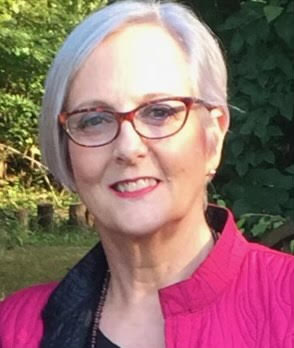 At 66, I was stung as the future I had anticipated seemed to be snatched away. The time I likely would not have with my children and grandchildren. I didn’t feel frightened as much as sad. I know that God is Lord of my past, present, and future, so I was secure in His will and His care.
At 66, I was stung as the future I had anticipated seemed to be snatched away. The time I likely would not have with my children and grandchildren. I didn’t feel frightened as much as sad. I know that God is Lord of my past, present, and future, so I was secure in His will and His care.
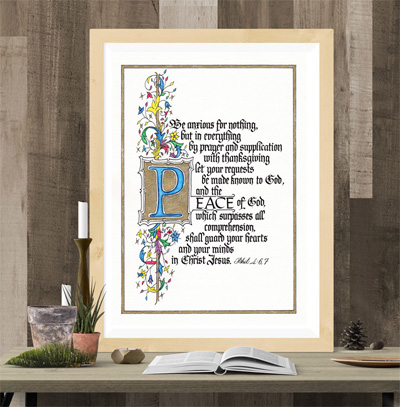 So I was doing my part, by confessing Psalm 56:3—”When I am afraid, I will trust in You,” and reminding myself of the power of Philippians 4:6-7—”Be anxious for nothing, but in everything by prayer and supplication with thanksgiving, let your requests be made known to God; and the peace of God, which surpasses all comprehension, will guard your hearts and your minds in Christ Jesus.”
So I was doing my part, by confessing Psalm 56:3—”When I am afraid, I will trust in You,” and reminding myself of the power of Philippians 4:6-7—”Be anxious for nothing, but in everything by prayer and supplication with thanksgiving, let your requests be made known to God; and the peace of God, which surpasses all comprehension, will guard your hearts and your minds in Christ Jesus.” But then I was able to speak briefly about what we have in common, a situational loss of freedom. I have lost the ability—the freedom—to walk, and they have temporarily lost the ability—the freedom—to walk out of lockup. Still, even while imprisoned by our situations, Jesus offers true freedom that has nothing to do with our circumstances. He promised to His disciples, “You will know the truth, and the truth will set you free.” He even said, “If the Son sets you free, you will be free indeed.” (John 8:32, 36)
But then I was able to speak briefly about what we have in common, a situational loss of freedom. I have lost the ability—the freedom—to walk, and they have temporarily lost the ability—the freedom—to walk out of lockup. Still, even while imprisoned by our situations, Jesus offers true freedom that has nothing to do with our circumstances. He promised to His disciples, “You will know the truth, and the truth will set you free.” He even said, “If the Son sets you free, you will be free indeed.” (John 8:32, 36)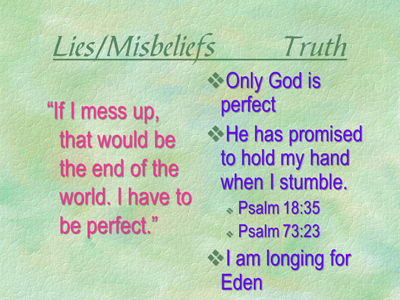 • As we look at our present, Jesus can set us free from the “tapes” of lies and misbeliefs that control our lives, as we replace the lies with His truths. For example, a number of the ladies at the retreat had lived in bondage to the lie that they had to be perfect in order to be acceptable. The weight of needing to be perfect is soul-killing because it’s impossible for imperfect people to be perfect! But we can be set free by embracing the truth that only God is perfect, so we can let go of the unrealistic expectation that we can ever live perfectly this side of heaven. God knows we will stumble, and He has promised to hold our hand when we do. And beyond that, He understands our longing for perfection is actually a longing for the perfect home of Eden, which we will get to experience on the New Earth we read about in the book of Revelation.
• As we look at our present, Jesus can set us free from the “tapes” of lies and misbeliefs that control our lives, as we replace the lies with His truths. For example, a number of the ladies at the retreat had lived in bondage to the lie that they had to be perfect in order to be acceptable. The weight of needing to be perfect is soul-killing because it’s impossible for imperfect people to be perfect! But we can be set free by embracing the truth that only God is perfect, so we can let go of the unrealistic expectation that we can ever live perfectly this side of heaven. God knows we will stumble, and He has promised to hold our hand when we do. And beyond that, He understands our longing for perfection is actually a longing for the perfect home of Eden, which we will get to experience on the New Earth we read about in the book of Revelation.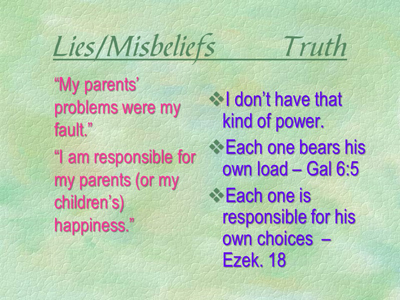 • One of my dear friends discovered, in the process of working through the challenges of parenting a prodigal adult child, that there is freedom in owning 100% of our own part and 0% of other people’s choices and behaviors. There’s no point in taking on guilt or responsibility for someone else’s choices; they are completely responsible for their part.
• One of my dear friends discovered, in the process of working through the challenges of parenting a prodigal adult child, that there is freedom in owning 100% of our own part and 0% of other people’s choices and behaviors. There’s no point in taking on guilt or responsibility for someone else’s choices; they are completely responsible for their part.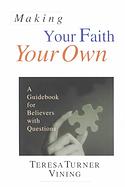 I want to recommend an excellent resource to you that will help build your faith by wrestling with the truth that will allow your faith to rest on the fact that it’s TRUE and not some warm fuzzy feeling. Teresa Vining wrote Making Your Faith Your Own after having some similar struggles to yours while she was in college.
I want to recommend an excellent resource to you that will help build your faith by wrestling with the truth that will allow your faith to rest on the fact that it’s TRUE and not some warm fuzzy feeling. Teresa Vining wrote Making Your Faith Your Own after having some similar struggles to yours while she was in college.